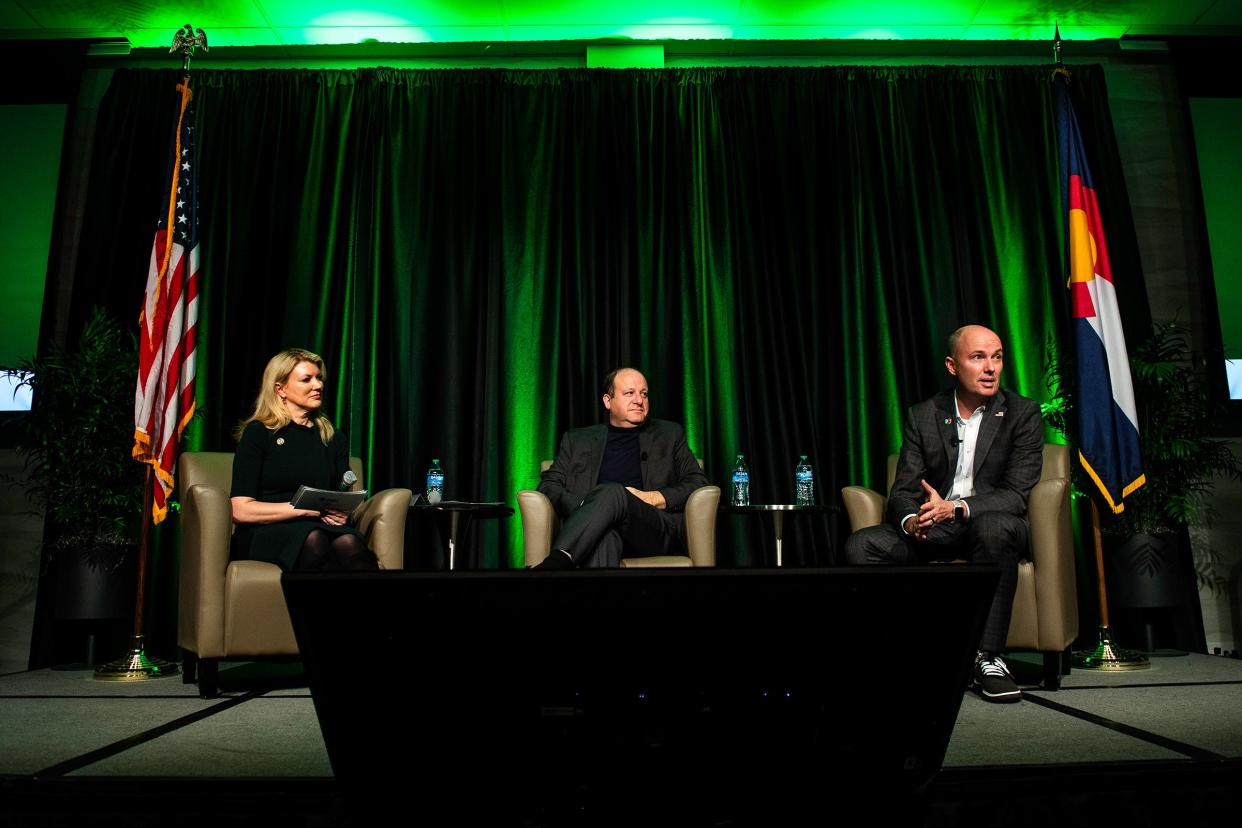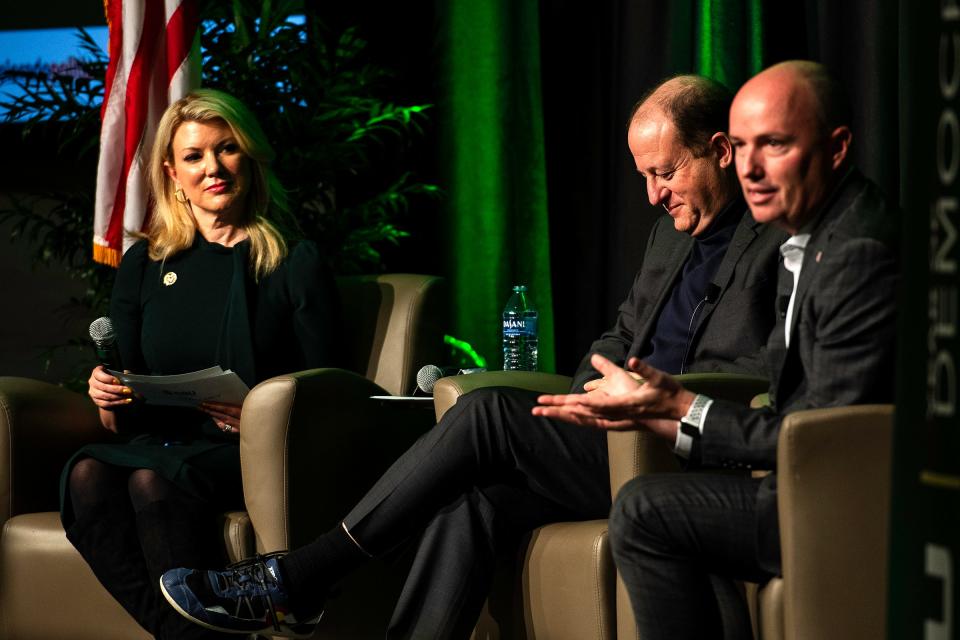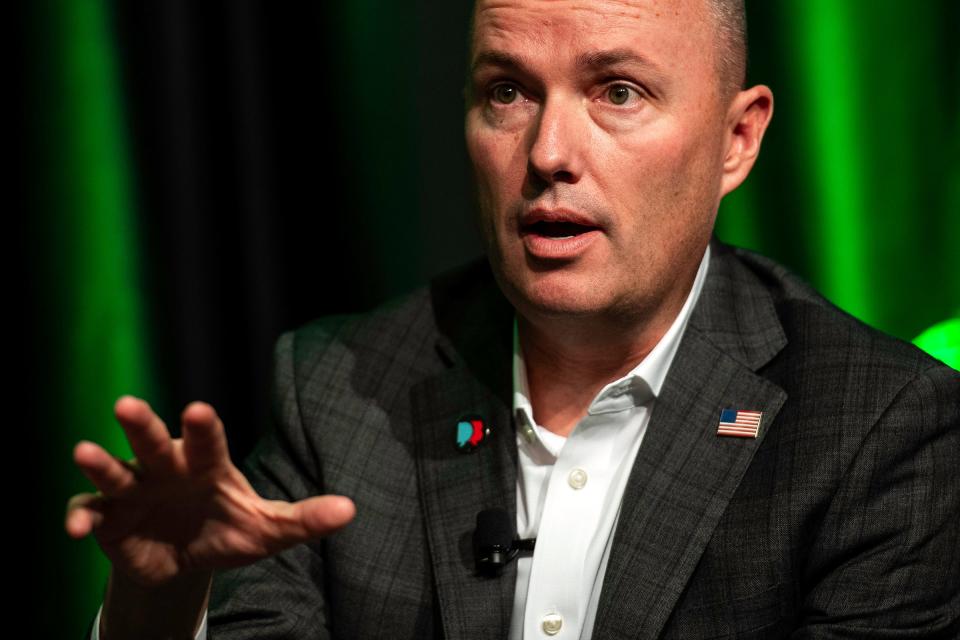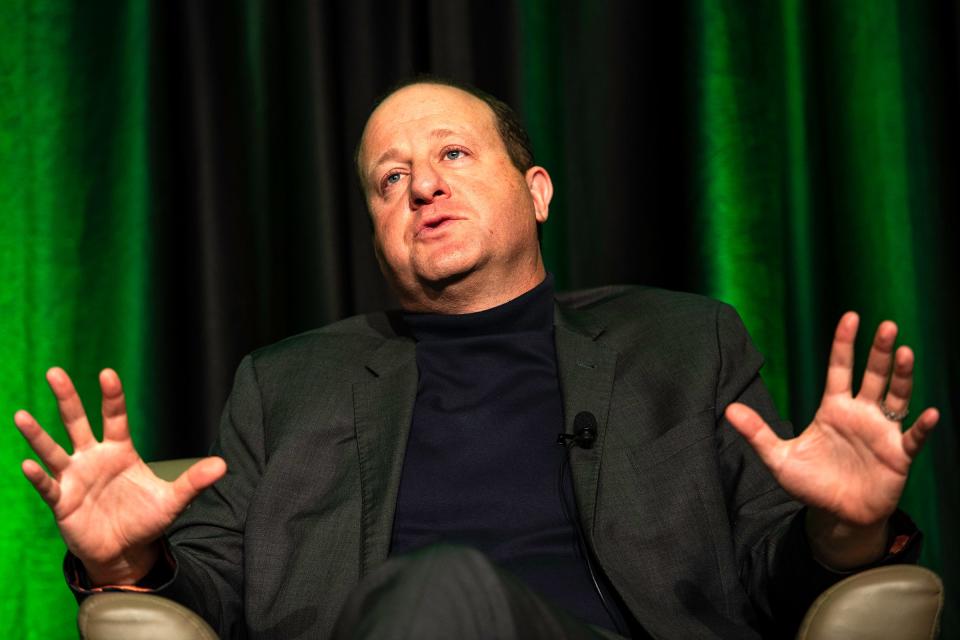Governors of Colorado, Utah urge civility in politics in 'Disagree Better' talk at CSU

- Oops!Something went wrong.Please try again later.
- Oops!Something went wrong.Please try again later.
Calling our present political polarization “the single most important issue in our country right now,” Utah Gov. Spencer Cox joined Colorado Gov. Jared Polis in a “Disagree Better” discussion Wednesday at Colorado State University.
Cox, a Republican, and Polis, a Democrat, expressed grave concerns about our society’s ability to have meaningful political discussion and debate with civility in hopes of finding solutions to our problems rather than focusing on attacking and defeating opponents at all costs.
Cox launched the “Disagree Better” initiative through the National Governors Association that he chairs. Polis is the vice chair. They had a similar discussion Tuesday in Westminster that also included Montana Gov. Greg Gianforte and Oklahoma Gov. Kevin Stitt, both Republicans.
CSU President Amy Parsons moderated Wednesday’s discussion with Cox and Polis in front of a live audience of about 200 people in the Never No Summer Room in the Lory Student Center. The event, part of CSU’s thematic Year of Democracy, was also livestreamed online.
“Our democratic institutions are failing,” Cox said. “We’re seeing an increase in political violence here. … We are passing all the checkpoints toward catastrophic failure of our democratic institutions because of this deep polarization that we’re seeing.
“I love our country. I care deeply about our country, and I think this is not just the issue of the year, I think it’s the issue of our generation. It is the single most important issue in our country today: Can we solve problems without hating each other? And right now, too many people are saying, ‘no.’ ”

Not just politicians, Polis said. But everyday people doing everyday things. Your MAGA uncle, he said, ought to be able to have a conversation over Thanksgiving dinner with his woke niece.
“Engage with others and bridge that divide,” Polis said. “We have a holiday coming up, Thanksgiving, a national day of gratitude. I think around extended family dinner tables, there’s people of all different political persuasions, and it’s a good opportunity to be curious, ask questions, be civil.
“I think too often we treat politics as something that can’t be discussed without toxicity. That’s kind of giving up on what it means to be a republic and have these discussions.”
More: Housing costs dominate forum discussion between CSU students, elected officials
Cox and Polis offered some suggestions on how to get people to open up and listen to opposing viewpoints.
“Be curious and ask questions,” Polis said. “Why do you feel that way? What do you think about it? Try to get them to understand your position.”
Cox said it’s important to approach topics with humility, something he said our country’s founding fathers, including George Washington, James Madison and John Adams, frequently spoke of and wrote about. Despite your convictions, leave open the possibility that your position could be wrong. That lets whoever you’re talking to not only know you are truly listening to them but also opens the door for them to consider that maybe their position is wrong.
He also urged people to stop watching cable television news, which tends to focus on the outrageous and extreme, turning members of Congress into performers rather than legislators.

There’s been far more coverage, Cox said, of Oklahoma Sen. Markwayne Mullin’s threat to fight the president of the Teamsters Union on the Senate floor Tuesday than of the bipartisan effort he and Polis are involved in along with five other governors from each party to address the country’s flawed immigration policies.
“My wife and I just celebrated 11 years of not watching cable news, and our marriage is better, our family is better,” Cox said. “People laugh when I say that; I’m telling you it’s true. Our lives are better; they’re happier, healthier because we stopped watching cable news.”
The two governors went on to share examples of working with people of opposing viewpoints to craft meaningful legislation.
More: Some employees left out of CSU's commitment to raise pay to a minimum $50,000 per year
Polis points to his work with Jim Wilson, then a Republican member of Colorado’s state House of Representatives, to provide state funding for all-day kindergarten as one of his first successful initiatives after becoming governor in 2019. Wilson had championed that issue for years without gaining much traction, but after joining forces with a Democratic governor, it passed with ease.
Ninety percent of the bills that have passed during his time as governor, Polis said, have had bipartisan support, thanks, in part, to the structure of Colorado’s General Assembly, which allows members of both parties to introduce bills. Members of the minority party in each house of Congress, where he previously served in the House of Representatives for Colorado’s 2nd District, he said, can never get bills out of committee to be voted upon.

Cox pointed to the 2015 passage of a bill in Utah — “maybe the reddest state in the nation,” he said — banning discrimination against LGBTQ people in housing and employment. He was the state’s lieutenant governor at the time and involved on the “fringes,” he said, but not in the day-to-day discussions that brought together members of the state legislature with Utah's LGBTQ and religious communities.
“They all came together, basically locked themselves in a room for like a month and they hammered out” what became known as the “grand compromise,” he said. It was a bill that protected the rights of LGBTQ people in housing and employment while also expanding the religious freedom of churches.
“It wasn’t winner-take-all kind of thinking; it was, 'How do we both find a win here?' And they did. And I’ll never forget that night. It was the last night of the legislative session. We had a signing of the bill in the rotunda with thousands of people there. Behind me, we had the high-level leadership from the Church of Jesus Christ of Latter-day Saints and the LGBTQ community embracing. We had the Eagle Forum, the most conservative group in the state, and Equality Utah standing shoulder to shoulder.
“That’s a high I’m still chasing. … That was one of the proudest days I’ve had in politics.”
Political party affiliations, both governors said, should not define who a person is socially. Sure, it’s part of who they are but not the end-all-be-all.
“Historically, our political identity was way down the list of how we defined ourselves in this country,” Cox said. “If that’s how you think of yourself first is as a conservative or Democrat or progressive or liberal or whatever, then you’re doing something wrong, and it’s really unhealthy. This has become a religion for far too many people.”
At the same time, Polis said, the rapid rise in unaffiliated voters — people “fleeing the Democratic and Republican parties” — shows that many people are recognizing the danger of going all in with a particular “tribe.”
Cox noted that recent polls by Dartmouth College show more than 70% of members of each major party don’t support their party’s frontrunner for the 2024 presidential nomination — President Joe Biden for Democrats and former President Donald Trump for Republicans.
Although that’s never happened before, Cox said, it also shows that there’s an “exhausted majority — because we’re tired, we’re hungry for something different” out there longing to put our representative democracy back on track.
“This country is special, it really is different,” he said. “This grand experiment that we embarked on almost 250 years ago, this idea of self-governance, this idea that our rights do not come from government or from a king but these rights come from on high — we’re born with them, we are endowed with them, that all of us are created equal and that we have these inalienable rights — life, liberty and the pursuit of happiness.
"Those are radical ideas, and they are still radical today. And they are worth fighting for, they are worth preserving. So, be proud of your country, flaws and all. We can make it better, and we should. But know that this year of democracy, this is it. This is the fight of our lives.”
Reporter Kelly Lyell covers education, breaking news, some sports and other topics of interest for the Coloradoan. Contact him at kellylyell@coloradoan.com, twitter.com/KellyLyell or facebook.com/KellyLyell.news.
This article originally appeared on Fort Collins Coloradoan: Governors of Colorado, Utah urge civility in politics in talk at CSU

